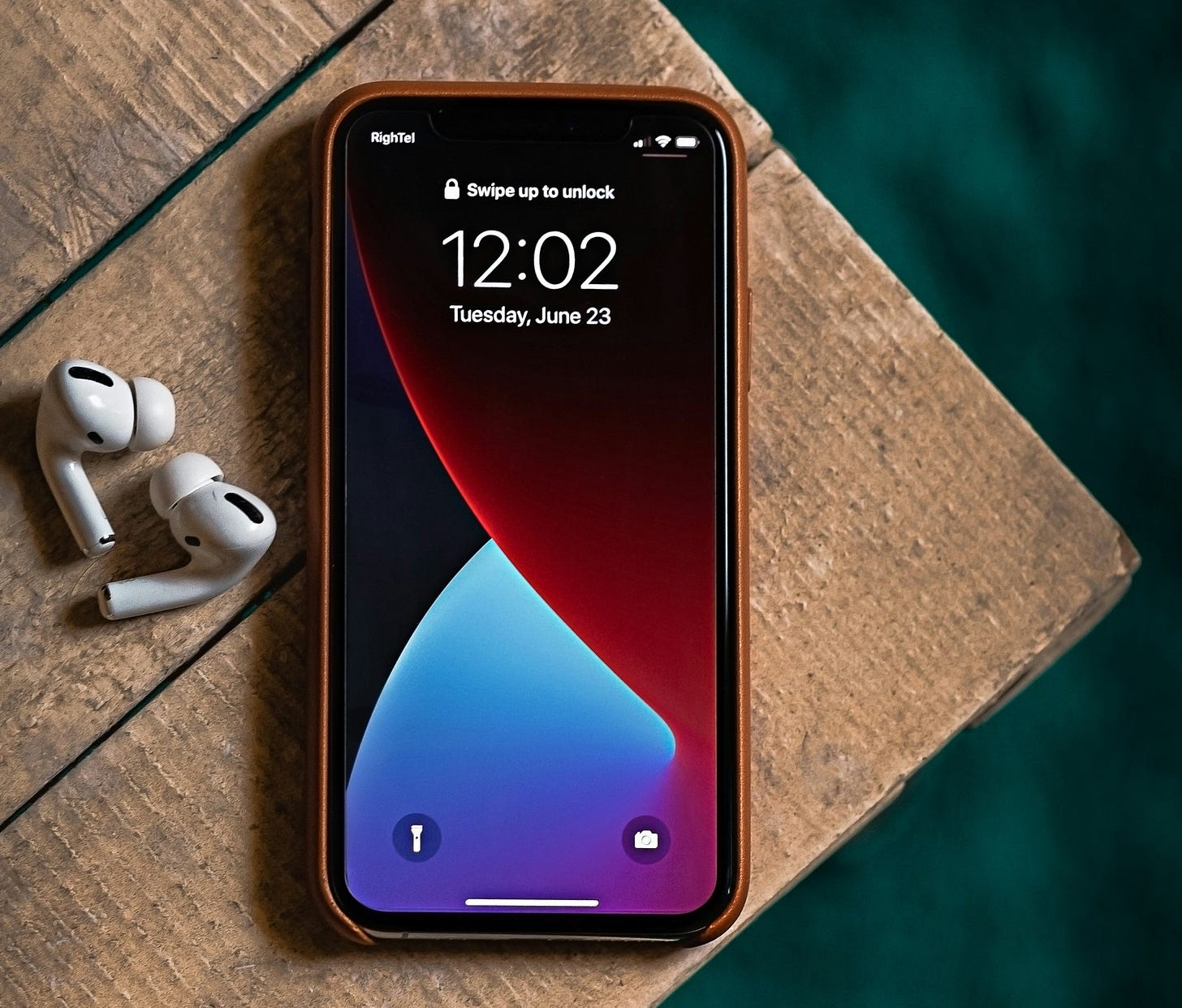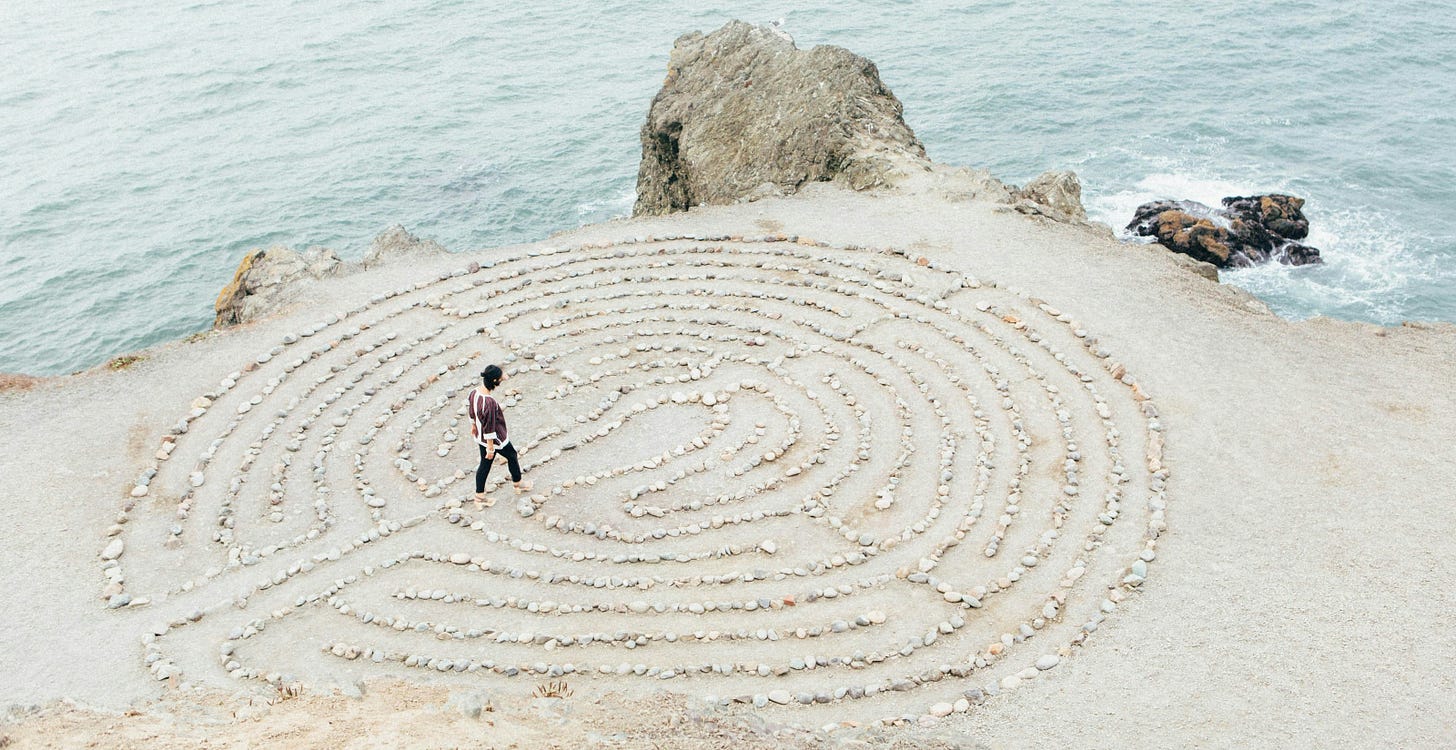Make your phone a 'happy place' - Week 1
I am not going to tell you to delete TikTok or never look at social media again. That would be ridiculous. In fact, I am not going to tell you to do anything! Intrigued? read on.
Hello everyone and welcome to phone month!
I renamed it from social media month, as actually, our phone use is more complex than just social media. I have found this as I have been experimenting with my own phone. I am so looking forward to hearing about your experiments!
And I think looking at this, as an experiment is really empowering. Cause it is trying things out and if you like them you keep them, if you don’t, you go back to what you were doing, no pressure at all. Just a bit of fun. There are so many ‘instructional’ posts about how you should delete TikTok or Instagram immediately. You must not doom scroll. I see those and I keep scrolling! Makes me scroll more, in fact. What they don’t tell you is why and how. My intention is that our experiment will be a bit different.
My invitation to you is to just simply try a few things out with me over the next 4 weeks and see what works for you, what doesn’t work and more, play with the ideas that are coming your way. Make them your own, make them work for you to create a happy place, that is your phone. I love things about my phone, but I also recognise I can get into some really unhelpful behaviours with it. And those behaviours are detrimental to me and those around me.
This is a 4 week experiment. Just a little bit, each week. No major time commitment involved. No telling you what to do. Your phone is your business, not mine. For some us, we may not be happy with how much we are on our phone, can’t break away from it and not sure why. We might find, at times, our phones lead to depression and anxiety and hit our self-esteem. If this if you, then you may find the next 4 weeks interesting! I realise this is not going to be for everyone, and that is ok.
This week:
This week is simply about building awareness of how and when and why you turn to your phone. Some of what you learn about your phone will not surprise you. Some may. I was not that surprised about how much I was on my phone, but I was surprised about how liberating, making a few changes has made to my mental health and general enjoyment of my life. I will admit, I had a bit of ‘happy phone’ relapse over Christmas but I am back on it now and I prefer it. I will reveal the changes I made in Week 4! It was not that many actually.
As a heads up:
Week 2 - is some of the evidence about the effects our phone use can have on us and also the science of why we do it. Nothing too heavy but just so you have some information about why get hooked and addicted. Often when we understand why, it can help us to make different choices.
Week 3 - Some new things to try out with how we use our phone. Suggestions not instructions!
Week 4 - results, learning and reflection
In summary what I am inviting you do is to look at how you use your phone, build a lovely awareness of it and then make choices about what you would like to do moving forward with it. To make your phone a source of building your self-esteem, sense of agency and freedom.
Photo by Ashley Batz on Unsplash
we are here ➡️➡️ Week 1 - Building awareness
I always encourage my clients to use a pen and paper to write things down. The reason for this is, that when we write with an old fashioned pen, the research suggests we process things 7x more. That is a lot of times more. If you are interested in why this is, please use the chat and I will be happy to explain. I just don’t want to make this too long and bore you! You might carry on scrolling!! And then there is the added benefit of stationery shopping!
So that is it, what this week is about, how, when and why do you use your phone and how do you feel afterwards. Awareness. If we are not aware of what we are doing, we cannot decide what we want to change. And you might get to the end of this first week and think, hey, I am real happy with how I use my phone. Great! For those that are not, we can move on to week 2.
Some suggestions:
Noticing what is happening just before you pick up your phone. For example, is your mind racing, has something happened (good or not?), are you bored, upset, anxious, hungry, feel overwhelmed, worried you have missed something, feel an urge to pick it up, feel the need to check something on it, angry, happy, frustrated, worrying, waiting, see someone else on their phone?
What were you doing? for example, are you in a meeting that is boring (or maybe it is an important meeting), are you having a conversation with someone, watching the tv, trying to get to sleep, on public transport, reading something not electronic, out for a meal with others (maybe you were all on your phones!?), writing a report, painting, decorating the house, cooking dinner, waiting for the kids to come out of school, walking the dog, in the middle of a tedious task?
What are you doing on your phone? social media (try to notice which one), email, games, news apps, WhatsApp, what other apps do you go to?
How long do you think you were on your phone (most phones have an app you can check how much you use your phone per day, you may want to check in with this at the end of each day to see if what you guessed and what really happened is the same).
What have you missed or gained from being on your phone?
If you were in an interaction with someone else and got distracted into looking at your phone, what reaction did they have?
When you stop using your phone, just check in with yourself, how is your mental state (e.g. anxious, fed-up, feel bad, feel happy, hate the world, feel not good enough)?
Analysis. This is the important bit! Do you see any patterns? eg when I feel lonely I go to facebook to see what my friends are doing and see them all having amazing fun together and I feel left out, more lonely, sad, upset and hurt and then angry.
I really don’t want to be too directive as I really want you to gather your data for your experiment in a way that makes sense for you. But I am VERY happy to help anyone work out how to do this.
You might want to do this with your friends, partner, family, teenagers, work team or colleagues?
How I did this: I had a simple table with columns that I used, more or less, the numbered points above at the top of each column so I could clearly see what my trigger for the phone was, why I went to it, what I did with it and how that made me feel. You may not need all of them. Just the way that makes sense to you so you can do the analysis. It may change over the week as you get used to it.
If you would like me to construct a simple form, just drop it in the comments below and would be happy too.
I have tried to write this in small steps. This might make it seem a lot, but once you work out what information you want to collect, it’s easy.
I am very happy to help you, so please don’t hesitate to message me or use the comments or chat 😊
With all kind wishes
Jane
Accredited Cognitive Psychotherapist
Cognitive Behaviour Therapy (CBT), Compassion Focussed Therapy (CFT), Mindfulness & Acceptance and Commitment Therapy (ACT)
If you would like to work with me on your self-esteem or anxiety you can go to my website at: www.janewatkinscbt.co.uk or email me at mail@janewatkinscbt.co.uk
Self-esteem is not just about confidence, it is the foundation of your human experience. It is your right to feel comfortable with yourself and flourish.
Subscribe now (it is all free at the moment) and join the movement towards healthy self-esteem development, something we can all benefit from, for ourselves and those around and us.







Great read 👍👍👍